Piano, Violin, Viola, and Cello Lessons
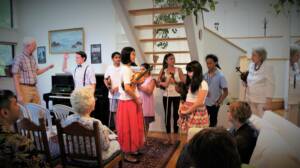
Students & parents at a Barrett Suzuki Music Studio group lesson
Private Music Lessons
Through our private music lessons, your children receive superior training and education from the Barrett Suzuki Music Studio. By using the proven Suzuki Method to teach your children, we instill a lifelong love of music and respect for the discipline involved in playing a musical instrument.
Online Lessons Anywhere in the World
With the onset of the Covid Pandemic in early 2020, Dr. Barrett transferred all of her lessons online using Zoom, Facetime, or whichever platform worked best for each student. While apprehensive at first, Dr. Barrett quickly discovered that the online lessons were as successful as the in-person lessons. Based on this success, Dr Barrett will continue teaching her current students online and will begin accepting new students for in-person or online lessons on a case-by-case basis.
Group Music Lessons
Participation in group lessons is a vital part of each student’s development, and groups are a hallmark of the Suzuki approach. Students have a great time playing together and using the repertoire from the Suzuki core curriculum. Often called a “play-in,” our group music lessons have students play up to their current level in the curriculum and continue to learn by watching others going on further in the curriculum.
This rich learning experience allows students close to each other in age to act as role models, showing their peers the sounds and techniques they will be learning as they advance through the repertoire. Students attend their weekly private or small group sessions each month and then two larger Saturday group sessions each month.
From Dr. Barrett’s post about online learning:
As the pandemic necessitated online learning, I was at first very concerned that it might be inferior to in-person learning. With the help of my students who were more tech-savvy than I, we overcame some initial challenges and learning seemed to be moving along well.
Groups were especially challenging until a student came up with an idea for a segment called “compliments and suggestions.” Students would play the piece they were currently working on and then each person in the group would give a brief compliment and a suggestion for how to make the piece even better (if they had one). Students really loved this! They were contributing with their comments as well as playing the violin. We stressed that this was not a criticism. It was a way to encourage successful work and help if there was a way to make the student even better. Its intention was to support and build up, not to criticize and or tear down. I began to have students asking “when is group” or “why don’t we have group this week?”
Another interesting thing with online group learning was that when students had successfully learned a piece they could find accompaniments online and play with an accompanist or symphony if their piece happened to be a concerto. This was interesting and fun and led to some challenging decisions about tempo – often bringing students to concert tempo without struggles.
The frosting on the cake was the success students were having in the outside world. A graduating senior in that first year of Covid – who was wanting to major in Music – was accepted at the Virginia Commonwealth University (VCU), her school of choice. She then successfully auditioned for and joined the VCU Symphony in her freshman year. An 8th grader moving into her High School Orchestra served as Principal Second upon her arrival. Another student that year, then a high school freshman, auditioned for two orchestras and became Assistant Concertmaster. Obviously, our new online learning approach was not slowing down any of our Barrett Suzuki students!
In 2021, our graduating senior was Concertmaster of the Loudoun Symphony Youth Orchestra and auditioned into the Charlottesville Symphony Orchestra. Their Concertmaster, a professor at UVA, invited him to join his Studio at UVA and found a 50% scholarship for his lessons from the Symphony. Another student – a high school sophomore – is serving on a rotating basis as Chamber concertmaster and principal 2nd violin at his high school. As a freshman, he had declined to audition for Chamber to stay with buddies in orchestra and got instantly moved into Chamber when the Orchestra Conductor heard him play.
Not a bad record overall I would say. This has convinced me that online learning can be very successful if handled properly, the Barrett Suzuki way, and hence I do not hesitate to continue with our very successful online learning programs.
About Our Music Lessons
Music lessons begin with pitch training so young children can begin to develop perfect pitch. For string instruments, a good sense of pitch is important as the string player actually creates the pitch in their instrument. We then spend some time on repertoire recognition, playfully called “Name That Tune,” as students become able to name the tune played by the teacher.
The tunes are taken from the CDs that go along with each book in the Suzuki series. Listening ahead like this is also a hallmark of Suzuki learning and greatly enhances the student’s ability to play in tune and memorize as they advance through the curriculum.
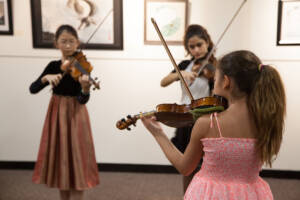
Violin students at a Barrett Suzuki recital
Violin & Viola Lessons
The violin is the most popular and well-known bowed string instrument of the symphony. It is the smallest of the violin family and is also known for its ability to reach high notes. The size, weight, and musical range of a violin make it the perfect starting instrument for a beginning musician.
At Suzuki Music Studio, we host both violin and viola classes that teach children the important skills they need to become talented musicians. Our violin teaching methods are derived from the Suzuki approach. Developed by the musician Dr. Shinichi Suzuki, this scholarly technique utilizes group lessons to help students inspire and learn from each other.
In our weekly private violin sessions, your child will begin learning pitch training so that they can develop an ear for identifying notes and chords. After learning pitch, students will spend time learning repertoire recognition where students will learn to be able to name tunes or songs played by their violin teacher.
A musician’s ability to recognize pitch and tones are both very important techniques to have when learning the violin. Since the violin has no visible frets or holes to memorize from a finger chart, a class must have violin instruction that can teach any young violinist how to identify the notes they are playing by sound.
Other music studios may not have proven techniques that can be used to train their student’s ears to hear specific notes and pitches. Instead of teaching this important skill, these teachers may only teach their students where their fingers should go and rely on the students to remember the notes this way. That approach does not create a solid foundation for playing music. At Suzuki Music Studio, we take pride in teaching our students important musical skills that will give them the ability to learn the violin, viola, and any other instrument available.
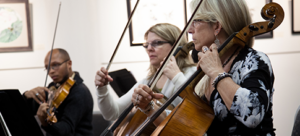
Cello players at Barrett Suzuki recital
Besides the violin and viola, the cello is another beloved member of the violin family. The cello has the unique capabilities of hitting notes in the bass clef, tenor clef, and treble clef.
To teach the full range that this instrument has to offer, it takes a cello teacher who has an extensive music background and is familiar with reading the entire musical scale. In our cello lessons, students can expect to learn to identify the pitches found in the cello’s broad musical scale. At Barrett Suzuki Music Studio, our students learn through a unique teaching method designed to train students to be attentive and resourceful in their learning habits.
Like our other classes, our cello sessions involve group learning characteristic of the Suzuki approach to learning. Each child will be given the opportunity to be lead through each musical score and lesson by an experienced cello instructor and then learn from the other children and parents by watching them. This kind of role-modeling lesson is combined with the student’s own efforts and creates a unique kind of cello instruction.
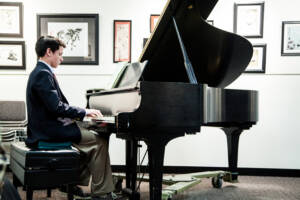
Piano student at Barrett Suzuki recital
When incorporating piano lessons into our studio curriculum, we relied on Dr. Suzuki as our guide. Dr. Barrett was first asked to teach piano by violin students she accompanied in their recitals. She soon learned that Dr. Suzuki’s longtime accompanist Dr. Haruko Katroka had established an approach to teaching piano called Piano Basics, which she culled from her close observation of Dr. Suzuki’s methods, as well as her own experience, training, and creativity as a piano educator.
Dr. Carolyn Barrett attended several seminars with Dr. Kataoka when she taught in the United States. She also learned from her successors in the Piano Basics approach at Piano Basics Seminars around the United States. By combining the Suzuki approach with the unique finger and arm techniques of Dr. Kataoka, students learn to play beautifully.
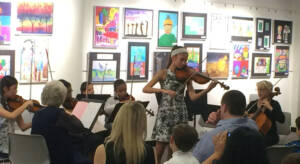
The Barrett Suzuki Ensemble plays at a recital
Ensemble Music Recitals in Reston, Virginia
One of the most special and unique activities held at our school, ensemble performances, allow our students to showcase their talents. The Suzuki Ensemble and Suzuki Concert Ensemble groups are open to students who have begun to develop their reading skill.
With our diverse learning groups, which include violin, viola, piano and cello, we are able to perform from a vast repertoire of available music for string orchestra as well as ensembles including pianos. We accompany students performing concertos from the Suzuki repertoire and other pieces that have string accompaniments.
In addition, we are often joined by colleagues of Dr. Barrett’s from the Loudoun Symphony Orchestra. They have shared they enjoy playing with our students because they are impressed by their good technique and musical sensitivity.
(Note: Due to the Covid Pandemic, our Ensemble Music Recitals are currently on hiatus, but we hope to resume them in 2023.)
Call us:
703-295-0659
Email us:

 Visit Us on Facebook
Visit Us on Facebook